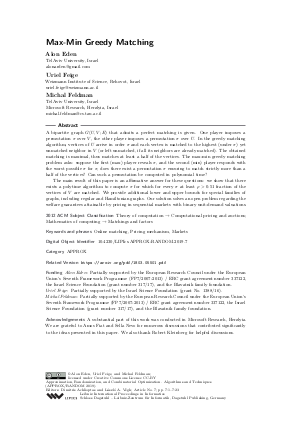@InProceedings{eden_et_al:LIPIcs.APPROX-RANDOM.2019.7,
author = {Eden, Alon and Feige, Uriel and Feldman, Michal},
title = {{Max-Min Greedy Matching}},
booktitle = {Approximation, Randomization, and Combinatorial Optimization. Algorithms and Techniques (APPROX/RANDOM 2019)},
pages = {7:1--7:23},
series = {Leibniz International Proceedings in Informatics (LIPIcs)},
ISBN = {978-3-95977-125-2},
ISSN = {1868-8969},
year = {2019},
volume = {145},
editor = {Achlioptas, Dimitris and V\'{e}gh, L\'{a}szl\'{o} A.},
publisher = {Schloss Dagstuhl -- Leibniz-Zentrum f{\"u}r Informatik},
address = {Dagstuhl, Germany},
URL = {https://drops-dev.dagstuhl.de/entities/document/10.4230/LIPIcs.APPROX-RANDOM.2019.7},
URN = {urn:nbn:de:0030-drops-112229},
doi = {10.4230/LIPIcs.APPROX-RANDOM.2019.7},
annote = {Keywords: Online matching, Pricing mechanism, Markets}
}

 Creative Commons Attribution 3.0 Unported license
Creative Commons Attribution 3.0 Unported license

